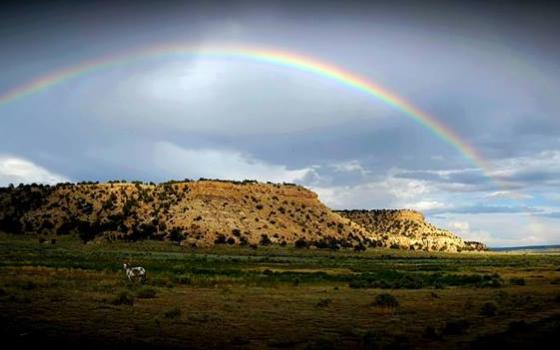Our nation is blessed with great diversity that struggles to be appreciated, respected and welcomed into our multicultural reality. What richness we would come to know if we took the time to listen to each other, to experience another's culture and values and to witness the beauty of their spirit towards all of life! These are not only the qualities of Native Americans but also other cultures that seek to share our life and earth home.
"I came to see and I left forever changed" captures my experience of ministering on the Navajo Reservation in northwest New Mexico for 24 years.
I began my ministry with an openness to learn and discover the richness of their culture, which, in turn, enabled me to form lasting relationships with the Navajo People, the "Diné" as they call themselves. Their ancient rhythms connected to life and creation; their respect and laughter captured my heart and drew me even more closely to them.
Their spirit is one of harmony with all of life. Their homeland is found within the four Sacred Mountains, each one of the mountains symbolizing spiritual and life-giving qualities. These mountains stand for the spiritual, physical, working together, balance, harmony, knowledge, hope, love and blessings. They believe that if they remain within these four Sacred Mountains, their lives will be filled with peace, beauty and harmony. When I heard the Navajo people call the earth Mother, and the sky Father, something resonated deep within me. They truly have such a deep connection and appreciation for the sacredness of the Earth.
This relationship to Mother Earth begins when a child is born: the placenta and umbilical cord are buried upon their family land or some other spiritually significant place so that the child will always have a deep connection to their Earth Mother. This sacred relationship with the earth is carried out in so many ordinary yet profound ways throughout their lives. For instance, when they go in search of firewood, they first express gratitude for the wood that will heat their homes and they ask permission of the tree to be cut down because they know that they would be doing harm to one of earth's creation.
They honor the rising of the sun with white corn meal marking the beginning of a new day, praying in gratitude for the gift and blessings this day holds. At noon, they gratefully pause to offer corn pollen for all that has been and for all that will be until their offering of yellow corn meal at sunset. It is at dusk that they acknowledge the blessings of the day and pray for the sleep that will allow them to be awake to welcome the morning sun of a new day.
They teach their children when they are small about the value of giving and appreciating life. The Navajo celebrate a baby's first laugh— yes, their first laugh! Family and friends come together to celebrate this special moment. At this celebration, the baby learns the joy in giving and that everything is sacred, including joy and laughter shared with family and friends.
Navajo rug weavers also incorporate the sacred in their rugs. These rugs are the personal and unique expression of each weaver. The design is captured in the mind of the weaver who sees the pattern in her mind's eye and expresses it in the weaving. The loom holds the rug and it brings together all of the weaving in a harmonious design. The rug weaving is often done in the area where the family gathers, where they welcome family and others who come to visit. The rugs capture and hold the memories of the conversations and events that take place in this living room, the joys and sadness, the illnesses and healings, the meals and celebrations. All of these moments and memories are woven into the fabric of this rug.
Traditional ceremonies honor their relationship with Mother Earth and their prayers and chants witness this sacred bond. They honor a young girl with a puberty ceremony, a Kinaalda, which prepares her to be a woman. Her grandmothers, aunts and other significant women teach her how to honor herself and her clan by being a woman who lives with integrity. Once again, this is a ceremony that all of her family come home to celebrate. It is an honor for a person to be asked to help in the preparations and rituals of this ceremony.
In weddings, in the Kinaalda, a baby's first laugh, and other ceremonies a Navajo wedding basket is central to the prayer. Symbolic of the universe and Mother Earth, the wedding basket speaks to the very beginnings of the Navajo people. The center of the basket represents the emergence of the Holy People, surrounded by the four sacred mountains, the earth, the clouds, rain and the rainbow, which blesses all of life. The opening of the wedding basket always faces the East in order to receive the blessings of each new day and cycle of life.
Navajo lives are so connected and attuned to prayer, to the sacred rhythm of life. There are many ceremonies for healing, restoring the harmony in the life of the person. When a young woman or man leaves for and returns from military service, a ceremony is offered for them so that not all they encounter in their time away will enter their minds or spirits in a troubling way.
In the prayer of the "Night Way," taken from the nine-day Navajo Night Way Ceremony, this kinship with the earth and with others is sung…
"In beauty may I walk.
All day long may I walk.
Through the returning seasons may I walk…
On the trail marked with pollen may I walk…
With dew about my feet may I walk.
With beauty may I walk.
With beauty before me may I walk.
With beauty behind me may I walk.
With beauty above me may I walk.
With beauty all around me may I walk.
In old age wandering on a trail of beauty, lively, may I walk.
It is finished in beauty. It is finished in beauty."
My spirit has not been the same since sharing life among the Navajo people. Their love and appreciation of the harmony of all life has found a home within me. It draws my attention to the profound beauty of creation, to the simple things that are so often missed or unappreciated. This sacred rhythm of life is like the heart beat/drum beat that resonates in my prayer and gratitude for every gift and blessing of life.
Where have you experienced the richness of another culture? Was it life changing for you? How in touch are you with your own culture and traditions? How can you be more aware of the little things that happen in your life and find ways to honor and celebrate them?
My life has been forever changed by the experiences of a culture different from mine but always in the depth of my soul, I hear … Walk in Beauty …
[Barbara Smith is an Adorer of the Blood of Christ. Her ministries have included work at Newman University in Wichita, Kansas, and parish ministry among the Navajo in Crownpoint, New Mexico. Called first to regional leadership and most recently congregational leadership in Rome, she is now awaiting God's surprising call to the next part of her journey.]

